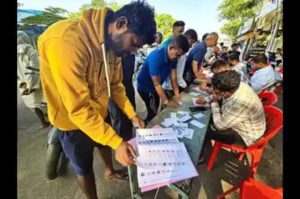Election Commission: In a move widely seen as a precursor to a fresh electoral update ahead of the 2026 West Bengal Assembly elections, the Election Commission of India (ECI) has made public the 2002 Special Intensive Revision (SIR) voter data for 109 assembly constituencies across 11 districts of Bengal.
The data, released by the office of the Chief Electoral Officer (CEO) of West Bengal, includes detailed electoral records from six districts in North Bengal—Cooch Behar, Jalpaiguri, Darjeeling, Uttar Dinajpur, Dakshin Dinajpur, and Malda—and five in the southern region—Nadia, Hooghly, Howrah, East and West Midnapore, and Bankura.
Election Commission: Historical Data to Aid Future Revision
This is the first time such historical electoral data has been made available for public access, and experts say it signals preparations for a major electoral roll cleansing exercise—potentially mirroring recent actions in Bihar and Delhi where the ECI has initiated similar SIR processes.
The 2002 SIR was the last such comprehensive voter list revision in West Bengal, conducted under the Left Front government. Since then, the state’s electorate has expanded significantly, now estimated at over 7.6 crore, compared to 4.7 crore in 2002.
Training and Administrative Preparation Underway
Simultaneously, the CEO office has launched extensive training programs for booth-level officers, assistant electoral registration officers (AEROs), and other poll officials. These sessions focus on the SIR process, which involves identifying and removing ineligible or duplicate voters, correcting entries, and adding new eligible names.
A senior official at the CEO office stated, “We are expecting instructions from the ECI shortly regarding the schedule and guidelines for Bengal’s upcoming SIR. The training ensures readiness.”
Action Taken Against Voter Roll Irregularities
As part of the electoral scrutiny process, the CEO’s office has also summoned three Assistant Returning Officers (AROs) from constituencies in Moyna, Baruipur, and Rajarhat. The summons follow complaints regarding suspected irregularities in voter rolls, including cases of false and duplicate entries. All three AROs have been instructed to submit detailed reports and justifications regarding their respective electoral rolls.
The Election Commission emphasized that such actions are routine to ensure transparency and accuracy in the voter rolls and are not targeted at any political party or region.
Political Debate Over the Timing
The release of the SIR data and ongoing revision activities have sparked a political debate in the state. Chief Minister Mamata Banerjee expressed concerns that the revision process might be used to target certain sections of the population under the guise of documentation.
“This sudden electoral urgency raises questions. We are watching closely,” she said during a press interaction in Kolkata.
In contrast, opposition leaders from the Bharatiya Janata Party (BJP) welcomed the move, asserting that updated and accurate voter lists are essential for fair elections and to prevent bogus voting, which they claim has been a persistent issue in West Bengal.
Background: What Is the SIR Process?
The Special Intensive Revision is a voter list updating exercise typically undertaken before major elections. It includes house-to-house verification, deletion of outdated entries (due to death or migration), and addition of new voters who have turned 18 or were previously excluded.

The revision process is backed by constitutional authority under Article 324 and is guided by the Representation of the People Act, 1950. While essential for electoral integrity, critics have warned that without proper safeguards, the SIR could lead to the disenfranchisement of genuine voters, particularly among poor and marginalized communities lacking documentation.
Concerns Echo from Other States
The developments in Bengal are being closely watched by civil rights groups, especially after the recent electoral revisions in Assam and Bihar where several voters were reportedly excluded due to documentation issues. Bengal shares a similar demographic and migration profile in several districts, prompting concerns that a poorly handled SIR could repeat the same problems.
Human rights organizations have urged the Election Commission to ensure clarity, public awareness, and a fair appeals process to prevent genuine voters from being wrongly removed from rolls.
Looking Ahead: Assembly Elections 2026
With the next West Bengal assembly elections scheduled for early 2026, the electoral revision is expected to begin in the coming months. The publication of the 2002 data serves not only as a reference point for the upcoming revision but also as a transparency measure aimed at building public trust in the ECI’s process.
Observers believe that once the final voter lists are published post-revision, they could play a critical role in shaping the political dynamics of the 2026 polls, especially in districts with contested voter demographics.
Key Points at a Glance
| Issue | Details |
|---|---|
| Data Released | 2002 SIR data covering 109 ACs from 11 districts |
| Purpose | Preparation for potential voter list revision ahead of 2026 polls |
| Political Response | CM Mamata Banerjee raises concerns; BJP supports move |
| Administrative Action | 3 AROs summoned over voter list complaints |
| Potential Impact | Could affect voter eligibility and political representation |
External References:
- Election Commission of India – Electoral Roll Management System
- Representation of the People Act, 1950 – Legislative.gov.in
- Press Information Bureau – ECI Notices and Guidelines
- National Law School of India University: Commentary on Voter Rights and SIR
Also read: Home | Channel 6 Network – Latest News, Breaking Updates: Politics, Business, Tech & More

